-
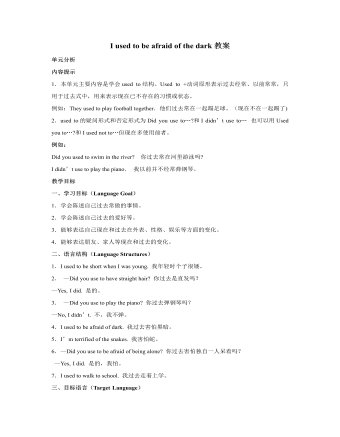
人教版新目标初中英语九年级上册I used to be afraid of the dark教案
内容提示1.本单元主要内容是学会used to结构。Used to +动词原形表示过去经常、以前常常,只用于过去式中,用来表示现在已不存在的习惯或状态。例如:They used to play football together.他们过去常在一起蹋足球。(现在不在一起踢了)2.used to的疑问形式和否定形式为Did you use to…?和I didn’t use to… 也可以用Used you to…?和I used not to…但现在多使用前者。例如:Did you used to swim in the river? 你过去常在河里游泳吗?I didn’t use to play the piano. 我以前并不经常弹钢琴。教学目标一、学习目标(Language Goal) 1.学会陈述自己过去常做的事情。2.学会陈述自己过去的爱好等。3.能够表达自己现在和过去在外表、性格、娱乐等方面的变化。4.能够表达朋友、家人等现在和过去的变化。二、语言结构(Language Structures) 1.I used to be short when I was young. 我年轻时个子很矮。 2. —Did you use to have straight hair? 你过去是直发吗?—Yes, I did. 是的。 3. —Did you use to play the piano? 你过去弹钢琴吗?—No, I didn’t. 不,我不弹。 4.I used to be afraid of dark. 我过去害怕黑暗。 5.I’m terrified of the snakes. 我害怕蛇。
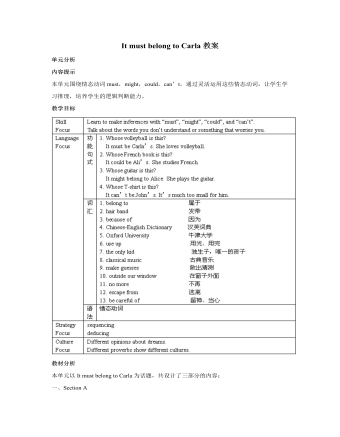
人教版新目标初中英语九年级上册It must belong to Carla教案
一、Section A该部分有4个模块。第一模块围绕Whose volleyball is this? 这一话题展开思维( 1a)、听力(1b)、口语( 1c)训练;第二模块围绕上一模块中的话题进行听力( 2a-2b)、口语训练( 2c);第三模块继续围绕前两个模块中的“making inferences”展开训练。训练形式为阅读排序( 3a)和两人问答(3b);第四模块仍就上一话题展开讨论。二、Section B该部分有4个模块。第一模块要求根据图画和所提供的单词写出合理的句子;第二模块在听力( 2a-2b)和分角色口语训练( 2c)的基础上,继续进行“推测”训练; 第三模块围绕“Strange events in Bell Tower neighborhood”这一话题展开阅读( 3a)和写作(3b -3c)训练;第四模块以dream为话题展开小组活动。三、Self Check该部分有3个模块。第一模块以填空形式对所学词汇进行训练;第二模块就8个谚语展开阅读和讨论。

人教版新目标初中英语九年级下册Could you please tell me where the restrooms are教案
Step Ⅰ RevisionCheck homework. Ask a few students to read the article in 3a.Then ask a few students to read their guides.Step Ⅱ Part 1Look at the words in the box. Ask a student to read them. Make sure the students understand the meaning of the words. You are to fill in the blanks with the words. In some cases, students may need to use another form of the word, for example adjusting for tense or subject/ verb agreement.Ask students to fill in the blanks on their own.Check the answers. Step ⅢPart 2Go through the instructions with the class.Look at the example with the students.Ask students what the answer would be.Ask a student to read the question and answer it.Excuse me, could you tell me where the bank is, please?The bank is across the street from the shopping malt.Get students to complete the work in pairs.Check the answers. Ask a few students to read their questions.Step Ⅳ Just for Fun!Ask all the students to read the conversation. Ask: What is funny about this cartoon? Help students to explain. A Martian is a person from the planet Mars.There is no such thing as Martian food on Earth, and the clerk looks silly because he is trying to think of where there is a Martian restaurant.Invite some pairs of students to present this conversation to the rest of the class.Step Ⅴ Summary and HomeworkIn this class, we’ve done much writing practice using the key vocabulary words and the target language presented in this unit. After class, please finish the questions in 2 in your exercise books. Then finish the exercises on pages 47~48 of the workbook as well.The Seventh Period Ⅰ Teaching Aims and Demands1. Knowledge Objects(1) Key Vocabularyimage, adventure, jealousy, hero, crime, journey, brave, no longer, show interest in, take it easy, become interested in, plain looks(2)Text:Grown-ups like cartoons, too.2. Ability Objects(1) Fast-reading to get a general idea of the text.(2) Careful-reading to get the detailed information in the text.

人教版新目标初中英语七年级上册Do you want to go to a movie教案
讨论喜欢的影视类型及理由:在看过一部影视作品后,大家总是喜欢在一起谈论影视的主要内容、主要情节、主要演员主题歌曲、主题音乐等,互相介绍自己对该影视的看法。教师可以组织一次活动,分组讨论学生喜欢看什么类型的电影,并说明喜欢的理由。运用I like…I don’t like…Because it is…等语言结构;然后每个组选派一名代表向全班学生阐述本组组员喜欢观看的电影类型;最后汇总,总结出全班同学最喜欢观看哪一种类型的电影。如果有可能,根据学生的选择放一部(一段)这种类型的影视节目。通过学生的讨论、调查,使他们在完成任务的过程中学会询问和陈述自己或别人在影视方面的喜好及理由,更好地巩固所学内容。Self Check教学内容Self Check(教材P58)教学目标知识与能力复习词汇go,movie,action,comedy,documentary,thriller,and,but,scary,funny, sad,exciting;引导学生复习、巩固“制订计划和打算并谈论喜好和偏爱”的目标语言。
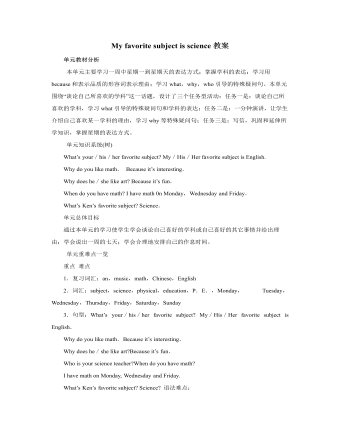
人教版新目标初中英语七年级上册My favorite subject is science教案
本单元主要学习一周中星期一到星期天的表达方式;掌握学科的表达;学习用because和表示品质的形容词表示理由;学习what,why,who引导的特殊疑问句。本单元围绕“谈论自己所喜欢的学科”这一话题,设计了三个任务型活动:任务一是:谈论自己所喜欢的学科,学习what引导的特殊疑问句和学科的表达;任务二是:一分钟演讲,让学生介绍自己喜欢某一学科的理由,学习why等特殊疑问句;任务三是:写信,巩固和延伸所学知识,掌握星期的表达方式。单元知识系统(树)What’s your/his/her favorite subject? My/His/Her favorite subject is English.Why do you like math. Because it’s interesting.Why does he/she like art? Because it’s fun.When do you have math? I have math 0n Monday,Wednesday and Friday.What’s Ken’s favorite subject? Science.单元总体目标通过本单元的学习使学生学会谈论自己喜好的学科或自己喜好的其它事情并给出理由;学会说出一周的七天;学会合理地安排自己的作息时间。
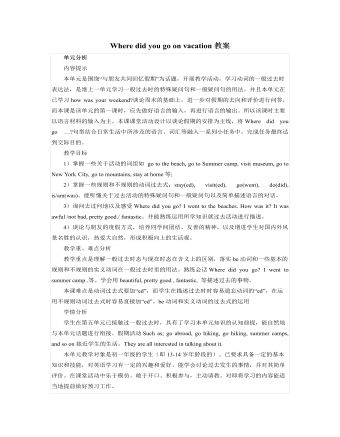
人教版新目标初中英语七年级下册Where did you go on vacation教案
句型: Where did you go on vacation? I went to summer camp.Did she go to Central Park?Yes,she did.No, she didn’t语法:一般过去时特殊疑问句、一般疑问句及肯、否定回答。课时安排4课时第一课时:Section A:la,1b,lc,2a,2b,2c 第二课时:Section A:3a,3b,4第三课时:Section B:1,2a,2b,2c第四课时:Section B:3a,3b,3c,4 and Self Check第一课时教学目标掌握描写假期生活的形容词。假期里自己所做事情的简单表达。谈论假期做的事情及当时情况。谈论假期时旅游的天气,旅游者以及食物等。教学过程一、导入播放一首英文歌曲:Let’s travel 说明:通过让学生听节奏欢快迪斯尼英语歌曲Let’s travel.引入本节课谈论的话题vacation and travel. 让歌曲使学生的思维活跃,增强课堂气氛,激发学生提高学习英语的兴趣。T:How is the trip ?Ss : It’s pretty good/ happy/exciting /relaxing/busy/dangerous/ fantastic说明:这个问题是为了操练形容词。建议让多个Ss作答。鼓励他们用不同的形容词。上述个别形容词本应在第二课时中出现,但可以在warming-up中第一次非正式出现。这些形容词也可在老师的评价语中适时出现,以加深学生对词汇的印象。
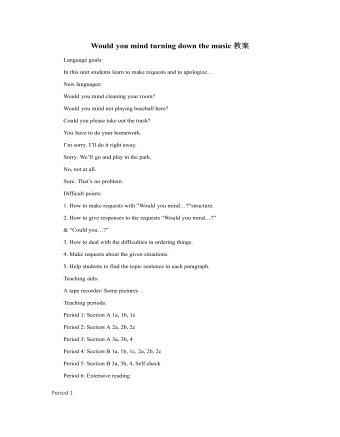
人教版新目标初中英语八年级下册Would you mind turning down the music教案
Step 4. Group work (4)1. Ask a pair of students to read the dialogue. Say, This activity provides speaking, listening and writing practice using the target language.2. Ask students to complete the work in groups.3. Check the answers with the whole class. 4. Explain some of the language points. Step 5. Word review (Self check 1)1. Ask students to read the words and the phrases given. 2. Fill in the blanks with proper forms of these words to complete the sentences. 3. Check the answers with the whole class. Homework:Do activity 2 on page 57 after class. Period 6Teaching aims: 1. Teach vocabulary words and the useful expressions. 2. Enable the students to learn etiquette in different culture. 3. Help the students learn how to behave politely in public places and in daily life. Teaching procedures:Step 1. RevisionHelp students to review the function of making requests through a free talk. Then lead them to the topic of etiquette. Explain the meaning of etiquette. Or, ask students to look it up in the dictionary. Step 2. Pre-reading (Section 1)1. Ask students to read the picture and make a list with their partner about how many rules of etiquette can be seen being broken.

人教版新目标初中英语九年级下册By the time I got outside, the bus had already left教案
Ⅰ. Teaching Aims and Demands1. Knowledge Objects(1) Key Vocabularyoversleep(2) Target LanguageWhat happened?I overslept. And by the time I got up, my brother had already gotten in the shower.2. Ability Objects(1) Teach the students to use the new words.(2) Train the students to narrate past events with the Past Perfect Tense.(3) Train the students' listening and speaking skills with the target language.3. Moral ObjectIt’s a good habit to go to bed early in the evening and get up early in the morning. So you’ll never be in a hurry in the morning.Ⅱ. Teaching Key Points1. Key Vocabularyoversleep2. Target LanguageNarrate past events with the Past Perfect TenseⅢ. Teaching Difficult Points1. Train the students to narrate past events with the Past Perfect Tense.2. Train the students to understand the target language in spoken conversation.Ⅳ. Teaching Methods1. Thinking of examples from the students' real lives.2. Making sentences by looking at the pictures.Ⅴ. Teaching AidA tape recorderⅥ. Teaching ProceduresStep I Revision1. Revise the language points in Unit 8.Ask some questions like this: What volunteer work would you like to do?Help the students to answer, I’d like to…/I love to…/I hope to2. Practice the dialogue in Activity 3c on page 62 again. Get students to role play the similar dialogues with the following.

人教版新目标初中英语九年级下册I’ll help clean up the city parks教案
Talk about offering help (P60)I’ll help clean up the city parks.A: I’d like to work ...B: You could help ...Talk about ways to tell people about the Clean-Up Day (P61)We need to ...We can’t ...I’ll ...Talk about the work the volunteers do (P62)These three students all volunteer their time to help other people.Somebody loves to ... / helps ... / plans to ... / wants to ...A: What do you like doing?B: I like ... A: What kind of volunteer work do you think I could do?B: You could ...1. 重点词汇advertisement, fix, repair, pleasure, blind, deaf, shut, carry, specially, fetch2. 认读词汇hunger, homeless, cheer, clean-up, sign, establish, major, commitment, elementary, veterinarian, coach, similar, call-in, strategy, disabled, organization, unable, support, appreciate, donation, part of speech, pronoun, adverb, preposition, conjunction, donate, Jimmy, Sally3. 词组clean up, cheer up, give out, put off, set up, think up, take after, fix up, give away, put up, hand out, work out, at once

人教版新目标初中英语九年级下册You’re supposed to shake hands教案
教学目标:1. 掌握本单元一些重点词汇的写法和用法。2. 学会自如谈论餐桌礼仪。Step 1 RevisionAsk some students to retell the customs at the table in France in the passage in 3a.Step 2 Self checkPart 1. Fill in each bland with the correct word given. Students do the exercises by themselves at first. Then check the answers. Ask the students to comprehend the sentences and help them point out uses of some words, like “arrive (at / in) sw., spend time / money on sth , spend time / money (in) doing sth.”Part 2. Read about Fan Ling’s experience in a western restaurant. Understand the passage. Point out some key points in the passage.1. be / get used to doing sth. 习惯做某事2. begin with = start with 以….开头3. crowd v. 挤满,塞满 the crowd 人群 crowded adj. 拥挤的Then students discuss about how she would solve her problem. Ask some to share their stories with others.Part 3. Complete the crossword by looking at the sentences on the left. Then check the answers.
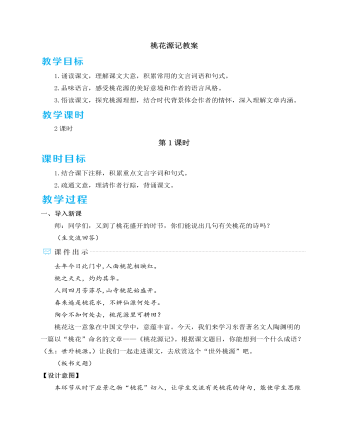
人教部编版语文八年级下册我一生中的重要抉择教案
五、总结存储1.教师总结这篇演讲词,作者用幽默诙谐的语言阐述了自己人生中的一个重要抉择——大力扶植年轻人。作者善于自我调侃,在自我解剖中进行了深入的分析,强调了扶植年轻人的重要性和必要性。演讲中列举了大量名人事例进行论证,使演讲具有很强的说服力。这篇演讲词展示了一位科学家精彩绝伦的语言魅力:不但有科学原理,而且有人生哲理;不但有学术的穿透力,而且有情感的震撼力;不但有理论的清晰度,而且有语言的幽默感——这一切构成了王选演讲的独特风采。我们在体会王选演讲魅力的同时,也领略到了他的人格魅力。2.布置作业(1)人的一生所做的重要抉择,如果与时代和国家紧密相连,意义会更加重大。我们在人生的关键阶段,如选择未来事业时,会做出怎样的抉择?请你写一段200字左右的演讲词,并在小组内演讲交流。(2)课外阅读王选的《我一生中的八个重要抉择》。
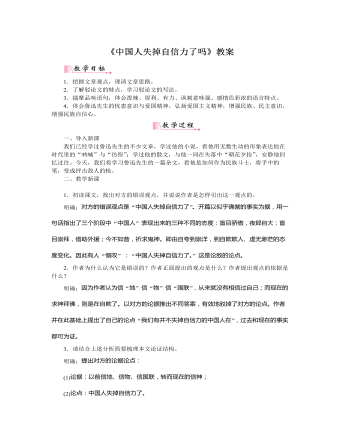
部编版语文九年级上册《中国人失掉自信力了吗》教案
一、导入新课我们已经学过鲁迅先生的不少文章,学过他的小说,看他用无数生动的形象表达他在时代里的“呐喊”与“彷徨”;学过他的散文,与他一同在失落中“朝花夕拾”,安静地回忆过往。今天,我们将学习鲁迅先生的一篇杂文,看他是如何作为民族斗士,将手中的笔,变成抨击敌人的枪。二、教学新课目标导学一:学习驳论,理清思路1.初读课文,找出对方的错误观点,并说说作者是怎样引出这一观点的。明确:对方的错误观点是“中国人失掉自信力了”。开篇以似乎确凿的事实为据,用一句话指出了三个阶段中“中国人”表现出来的三种不同的态度:盲目骄傲,夜郎自大;盲目崇拜,借助外援;今不如昔,祈求鬼神。即由自夸到崇洋,到自欺欺人、虚无渺茫的态度变化。因此有人“慨叹”:“中国人失掉自信力了。”这是论敌的论点。
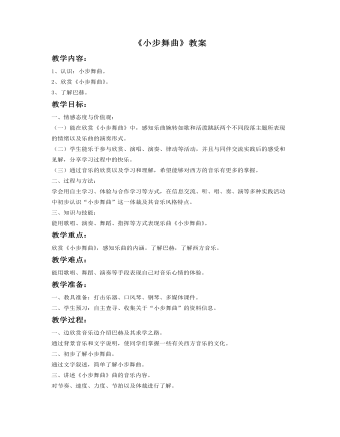
《小步舞曲教案》教案
教学过程:一、边欣赏音乐边介绍巴赫及其求学之路。通过背景音乐和文字说明,使同学们掌握一些有关西方音乐的文化。二、初步了解小步舞曲。通过文字叙述,简单了解小步舞曲。三、讲述《小步舞曲》曲的音乐内容。对节奏、速度、力度、节拍以及体裁进行了解。四、结合谱例分段学习《小步舞曲》。1、学习乐曲A’段。说明:依据乐曲创作背景,合理创设“舞会”情景,从而有效激发学生学习兴趣,用舞蹈表现手段演绎此乐段,发展了学生的舞蹈表演能力,享受到美的愉悦。2、学习乐曲B段。说明:利用形象、直观的图式辅助以及一系列贴近学生思维逻辑的问答讨论,激发学生的思考,帮助学生准确把握乐段情绪,并能用指挥、伴奏等方式表现该乐段。3、完整欣赏《小步舞曲》。说明:学生在完整欣赏乐曲时能够巩固乐曲主题的记忆,并且听辨、感受乐曲两个不同主题情绪,培养学生独立的音乐感受和见解。五、视频欣赏。说明:通过视屏欣赏,使同学们以一个更直观的郊区去理解和学习作品,并使同学对作品有更深刻的记忆。引起学生共鸣,领悟音乐的美感,愉悦身心,获取乐趣,从而激起学习的情趣。
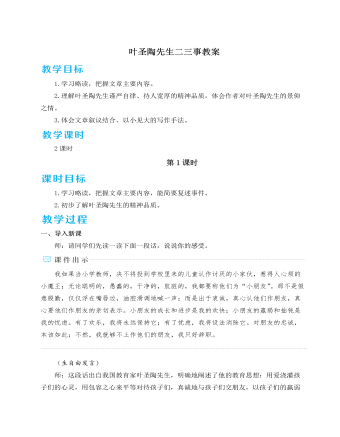
人教部编版七年级下册叶圣陶先生二三事教案
我认识圣陶先生是在成都,1941年春天的一个细雨蒙蒙的上午。那时候我在华西大学中国文化研究所工作,圣陶先生在四川省教育科学馆工作。教育科学馆计划出一套供中学语文教师用的参考书。其中有一本《精读指导举隅》和一本《略读指导举隅》,是由圣陶先生和朱佩弦先生合作编写的。计划里边还有一本讲文法的书,圣陶先生从顾颉刚先生那里知道我曾经在云南大学教过这门课,就来征求我的意见,能否答应写这样一本书。我第一次见到圣陶先生,跟我想象中的“文学家”的形象全不一样:一件旧棉袍,一把油纸雨伞,说话慢言细语,像一位老塾师。他说明来意之后,我答应试试看。又随便谈了几句关于语文教学的话,他就回去了。那时候圣陶先生从乐山搬来成都不久,住家和办公都在郊外。过了几天,他让人送来一套正中书局的国文课本,供我写书取用例句。
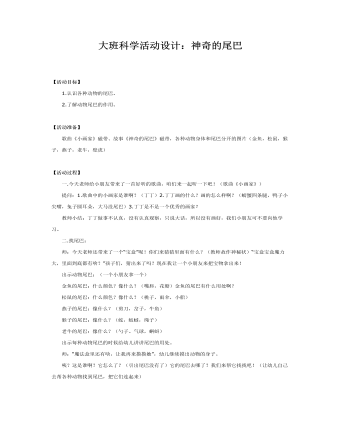
中班科学:神奇的尾巴课件教案
2.了解动物尾巴的作用。 【活动准备】 歌曲《小画家》磁带、故事《神奇的尾巴》磁带,各种动物身体和尾巴分开的图片(金鱼,松鼠,猴子,燕子,老牛,壁虎) 【活动过程】 一.今天老师给小朋友带来了一首好听的歌曲,咱们来一起听一下吧!(歌曲《小画家》) 提问:1.歌曲中的小画家是谁啊?(丁丁)2.丁丁画的什么?画的怎么样啊?(螃蟹四条腿,鸭子小尖嘴,兔子圆耳朵,大马没尾巴)3.丁丁是不是一个优秀的画家? 教师小结:丁丁做事不认真,没有认真观察,只说大话,所以没有画好,我们小朋友可不要向他学习。
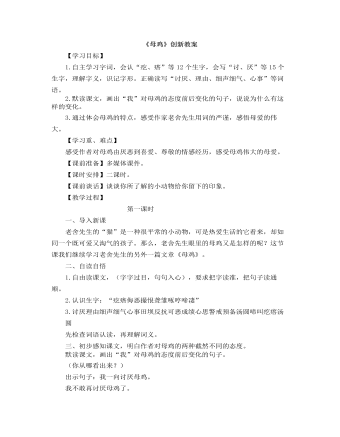
部编人教版四年级下册《母鸡》创新教案
指名学生交流:你选择了是哪个自然段。出示段落(1)不论是在院里,还是在院外,它总是挺着脖儿,表示出世界上并没有可怕的东西。一只鸟儿飞过,或是什么东西响了一声,它立刻警戒起来:歪着头听;挺着身儿预备作战;看看前,看看后,咕咕地警告鸡雏要马上集合到它身边来!你感受到这是一只怎样的母鸡?(勇敢、负责)从文中哪些词语中体会出来。还有同学想说吗?师:从“挺着脖儿、立刻警戒、挺着身儿、咕咕地警告”这些词语我们体会到了勇敢、负责、辛苦的鸡妈妈。现在让我们展开想象的翅膀。想象一下还有哪些情况它立刻警戒起来。(教师口述情境,学生试着说这些词语。)小结:这只母鸡,不论在院里,还是在院外,它总是挺着脖儿。多么负责、勇敢呀!一齐读。
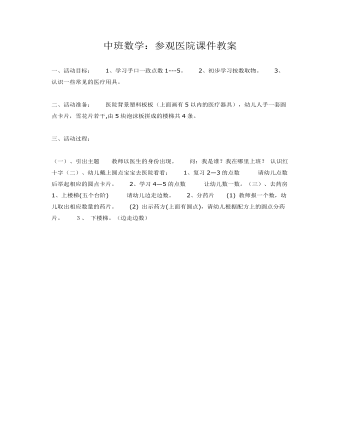
中班数学:参观医院课件教案
二、活动准备: 医院背景塑料板板(上面画有5以内的医疗器具),幼儿人手一套圆点卡片,雪花片若干,由5块泡沫板拼成的楼梯共4条。三、活动过程:(一)、引出主题 教师以医生的身份出现。 问:我是谁?我在哪里上班?认识红十字(二)、幼儿戴上圆点宝宝去医院看看: 1、复习2—3的点数 请幼儿点数后举起相应的圆点卡片。
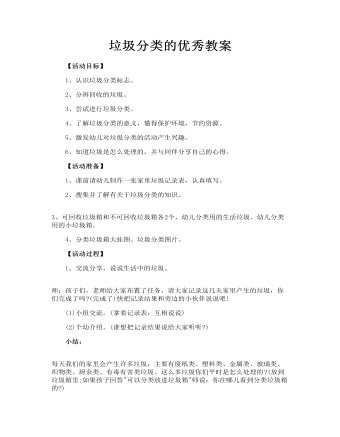
垃圾分类的优秀教案 垃圾分类优秀教案3篇
1、交流分享,说说生活中的垃圾。 师:孩子们,老师给大家布置了任务,请大家记录这几天家里产生的垃圾,你们完成了吗?(完成了)快把记录结果和旁边的小伙伴说说吧! (1)小组交流。(拿着记录表,互相说说) (2)个幼介绍。(谁想把记录结果说给大家听听?)
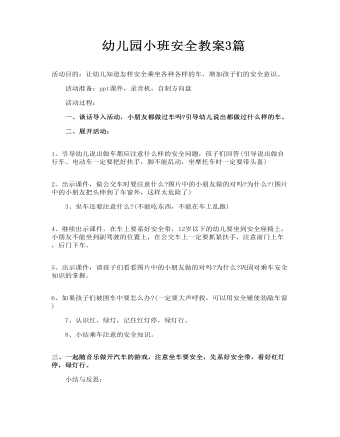
小班安全教案 幼儿园小班安全教案3篇
二、展开活动: 1、引导幼儿说出做车都应注意什么样的安全问题,孩子们回答(引导说出做自行车、电动车一定要把好扶手,脚不能乱动,坐摩托车时一定要带头盔) 2、出示课件,做公交车时要注意什么?图片中的小朋友做的对吗?为什么?(图片中的小朋友把头伸到了车窗外,这样太危险了) 3、坐车还要注意什么?(不能吃东西,不能在车上乱跑) 4、继续出示课件,在车上要系好安全带,12岁以下的幼儿要坐到安全座椅上,小朋友不能坐到副驾驶的位置上,在公交车上一定要抓紧扶手,注意前门上车,后门下车。
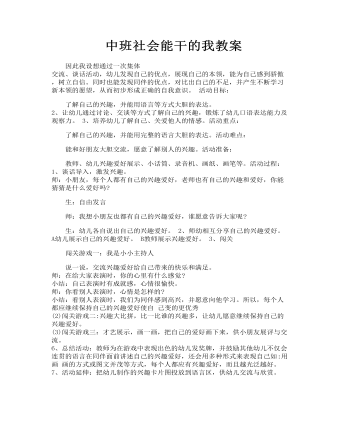
能干的小手中班教案中班社会能干的我教案
1、谈话导入,激发兴趣。 师:小朋友,每个人都有自己的兴趣爱好,老师也有自己的兴趣和爱好,你能猜猜是什么爱好吗? 生:自由发言 师:我想小朋友也都有自己的兴趣爱好,谁愿意告诉大家呢? 生:幼儿各自说出自己的兴趣爱好。 2、师幼相互分享自己的兴趣爱好。A幼儿展示自己的兴趣爱好。 B教师展示兴趣爱好。 3、闯关 闯关游戏一:我是小小主持人

